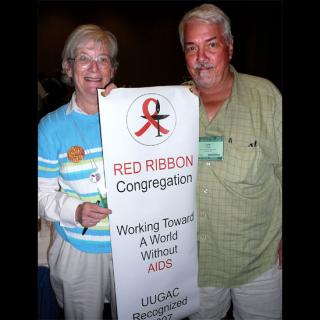Building a UU Global Social Justice Movement

General Assembly 2007 Event 3029
The Unitarian Universalist Global AIDS Coalition told its story to the attendees of this General Assembly (GA) workshop in an effort to gain support for its fight against the disease that kills as many as three million people a year. The coalition currently consists of five congregations engaged in education, advocacy and direct service. To enlist new backers, the coalition has defined a Red Ribbon Congregation program modeled after the Welcoming Congregation and Green Sanctuary movements. Churches interested in taking part in the AIDS fight can apply to the program from the coalition’s website.
Separately, the group has teamed up with the Unitarian Universalist Association (UUA) to strike down a bill that puts significant restrictions on U.S. funding for AIDS relief. As many as 25 churches are participating in a post card campaign to support the UUA’s legislative program on AIDS funding. “It’s rare we have this much support from volunteers,” said Adam Gerhardstein, a legislative assistant for international affairs in the UUA’s Washington office. The coalition is “a strong example of how in even very individualistic congregations we can join together to bring our vision of justice to life,” he said.
The annual Unitarian Universalist gathering has been a key touchstone for the coalition, said Ann Pickar, chairwoman of the group she helped found five years ago. Pickar attended the 2002 GA in Quebec where she heard Stephen Lewis, a United Nations envoy on AIDS, deliver the Ware Lecture. “I just happened to hear his message that three million people a year die, and that they could be saved,” said Pickar, a member of First Unitarian Church of Portland, Oregon.
After GA, she helped start a series of classes on AIDS that led to setting education, advocacy, and direct action as goals. At the GA in Boston in 2003, the Portland group helped spearhead an Action of Immediate Witness about the AIDS pandemic. “That put the issue on the record with the UUA advocacy office,” said Pickar. “The big difficulty of any grassroots movement is letting people know what you are doing. GA was great for that.” She added “If you are trying to build something on a national level GA is the place to be.”
Lyle Smith from the Michael Servetus UU Fellowship of Vancouver, Washington, became one of the first members of the coalition outside Portland, helping to define the Red Ribbon program. “I was actually born in Africa on December 1, which now is World AIDS Day, so I guess this was destined to be something I would get involved in,” Smith quipped.
Pickar has made trips to slums in Nairobi and elsewhere in Africa as part of her AIDS work. “About 40 million people worldwide have been infected with HIV/AIDS, as many as 70 percent of them in sub-Saharan Africa,” said Pickar. “The infection rate is as high as 40 percent among adult populations in Swaziland and Botswana,” she added. Among the more chilling statistics, Pickar noted that 2.3 million children have been born with HIV/AIDS transmitted from their mothers. “Only one in ten pregnant women with the disease take precautions against transmitting it to their unborn children,” she said. As many as a third of those babies die before they turn one year old.
Rev. William Sasso of the Carbondale Unitarian Fellowship, in Illinois, reported on that congregation’s extensive efforts with the coalition. The group has held multiple fundraisers and events with the local university, hospitals, and hospices and has made multiple visits to Africa for direct aid.
On the legislative front, the UUA is supporting the Pathway Act. It would permanently eliminate a requirement to divert a third of current federal AIDS funding to education programs that forbid teaching about the use of condoms. The programs are, instead, required to teach only about sexual abstinence before marriage. The UUA helped organize visits with more than 40 members of Congress last week, gaining co-sponsors for the Pathway Act.
Reported by Rick Merritt; edited Pat Emery.